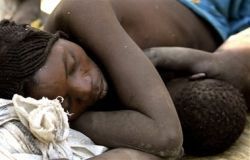Darfur costs Sudan again Africa leadership
Jan 29, 2007 (ADDIS ABABA) — The African Union chose Ghana to head the 53- member bloc Monday, turning aside Sudan’s candidacy for the second year in a row because of the worsening bloodshed in Darfur.
 The UN secretary general, Ban Ki Moon, had opened the summit meeting with a call on African leaders to end the deadlock created by Sudan’s refusal to allow UN peacekeepers into Darfur, in western Sudan.
The UN secretary general, Ban Ki Moon, had opened the summit meeting with a call on African leaders to end the deadlock created by Sudan’s refusal to allow UN peacekeepers into Darfur, in western Sudan.
Ban later said he and President Omar al-Bashir of Sudan agreed “to accelerate joint African Union-United Nations efforts for the political process and the preparation for a peacekeeping mission.”
Late Monday in Khartoum, a Sudanese Foreign Ministry spokesman, Ali Sadiq, said his country had agreed to cooperate on a “hybrid force” for Darfur, including UN troops, although final figures were not set.
Bashir has opposed a Security Council resolution that calls for 22,000 UN peacekeepers to replace or absorb an African force. The AU has 7,000 peacekeepers struggling to end the fighting.
Sudanese leaders were adamant that they deserved the rotating chairmanship, but international organizations opposed it, accusing the Sudanese government of taking part in the conflict in Darfur.
Rebel leaders in the Sudanese region have said they would stop considering the AU peacekeeping mission as an honest broker there if Sudan was selected.
“By consensus vote,” President John Kufuor of Ghana “has been elected to the presidency of the African Union,” Alpha Oumar Konare, the AU’s chief executive, told reporters in the Ethiopian capital, Addis Ababa.
Sudan had pushed to obtain the post at the summit meeting last year, which it hosted, but African leaders selected Republic of Congo’s president in a compromise deal in which he would hold it for a year and then hand it over to Bashir. But the deal hinged on Sudan demonstrating progress in bringing peace to Darfur. Instead of calming, Darfur’s violence in recent months has spilled into neighboring Chad and Central African Republic.
“African heads of states will have to stick to their word,” Sadiq had said Sunday, insisting that Bashir should have the post.
More than 200,000 people have been killed and 2.5 million displaced in Darfur since rebels took up arms against the central government in 2003. Sudan’s government is accused of retaliating indiscriminately against civilians and supporting janjaweed paramilitary groups blamed for some of the worst atrocities in the conflict. Sudan’s government denies the allegations.
The Sudanese government signed a peace agreement with one Darfur rebel faction in May, but violence has worsened. Sudan and Chad also have been trading accusations of supporting each other’s rebel groups.
In a keynote speech, Ban pressed for UN peacekeepers for Darfur and called for aid workers to be allowed to operate in Darfur, as humanitarian agencies said their operations were on the brink of collapse.
Ban, on his first visit to Africa since taking over from Kofi Annan on Jan. 1, held talks later Monday with Bashir for about 90 minutes that were “useful and constructive,” according to a statement released at the United Nations.
“We agreed to accelerate joint African Union-United Nations efforts for the political process and the preparation for a peacekeeping mission, based on the Abuja and Addis Ababa agreements.
Bashir “reiterated his government’s commitment to implement these agreements,” the statement added.
Sadiq, the Sudanese Foreign Ministry spokesman, said: “What has come to be known as the hybrid force has been agreed on by all parties, including Sudan.”
He said no final agreement on the troop numbers had been reached, although AU and UN officials say the UN could be sending as many as 10,000 to 15,000. Sadiq said UN troops could begin deploying in July.
Sudan has in the past reneged on agreements to allow the UN in, and al- Bashir — who has the final say on such matters — was not immediately available for comment.
Ban’s statement also said he expressed his “deep concerns over the continuing violence and deteriorating human right situation in Darfur, which afflicts millions of people.”
“I urged President al-Bashir, as I urge all parties, to cease hostilities, as an essential foundation for a successful peace process, and humanitarian access,” Ban said.
Bashir agreed “to facilitate such access, and expressed willingness to cooperate with international efforts toward that end,” the UN chief said.
Ban also said he would send his special envoy, Jan Eliasson, and an AU envoy, Salim Salim, to the region in February.
A French aid group said it was pulling out of western Sudan because of insecurity. Six other international charities have said their work will soon be paralyzed unless urgent action is taken.
(AP)
